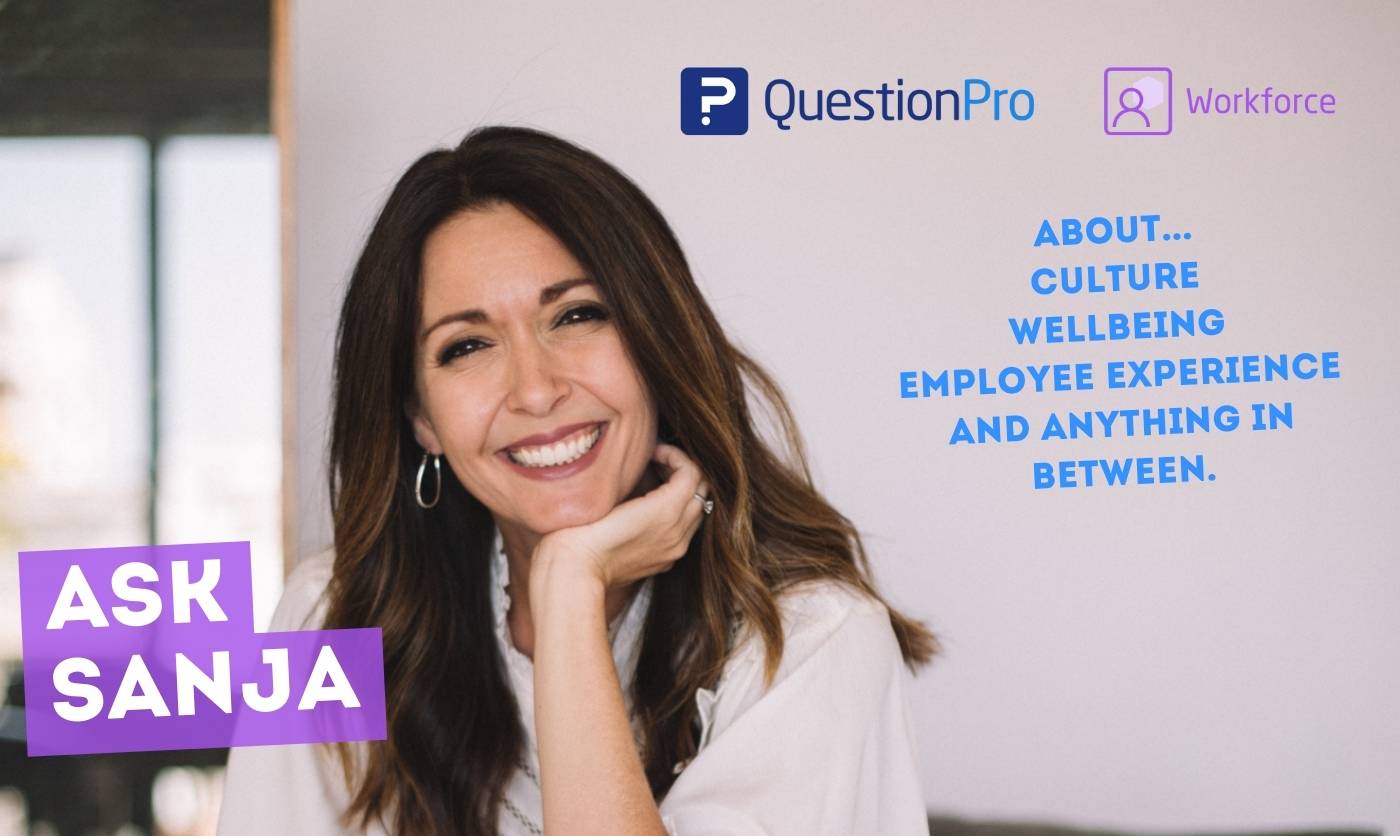
The world of work is complicated, but we don’t have to navigate it alone. As someone who is incredibly passionate about helping people feel more fulfilled by their work and helping create better workplaces, I am launching this advice column to share my knowledge with the community.
I am an organizational psychologist, president of QuestionPro Workforce, a podcaster, a mom of an amazing 4-year-old. Ask me anything work related and I will draw on all my experience to give you the best advice I know.
Question: I want to put more energy behind our Diversity & Inclusion initiatives. We have asked some basic questions on annual surveys so far, but have not taken much action on it. I am so excited about getting going, but it also feels like a really big undertaking. What should I keep in mind as I get started?
- Anonymous
I’m so glad that you are putting more energy into D&I in your organization! Here are several recommendations I would make as you get started.
- If you are looking to narrow down which part of the employee lifecycle to focus on, we found that retention is usually the biggest challenge for organizations when it comes to D&I, more so than recruiting. If you have some relevant existing data you can check if this applies to your organization as well, but if you don’t have clear data on this yet, retention related questions are a good place to start.
- Focus on asking questions that you feel like you can take immediate action on. Especially if this is your first opportunity for a more thorough D&I survey you might be tempted to ask a lot of questions, but your colleagues will expect actions for the areas they were asked input on, so the more focused the better. Also, staying concise will help make sure you get a greater survey completion rate.
- Measure your baseline, but tailor the wording more to ask more “how satisfied are you with XYZ” vs “how are we performing on XYZ.” Most leaders on your part of the journey don’t want to be asked about how they are performing as it’s not quite fair to be “evaluated” on something you have not focused on improving yet.
- Ask more questions about an individual’s personal experience rather than their perception of the organization overall. Questions like “I feel comfortable sharing my opinions in meetings” can be more useful than “Our culture allows everyone to voice their opinions in meetings.”
Of course there is a lot to consider when starting any survey project, especially something as big and important as D&I. I hope this helps get you going, and if you have any follow-up questions, please do not hesitate to reach out.
Sincerely,
Sanja
Question: As hard as I try, I can’t get my C-suite interested in innovative workforce measures, like the UK 4-day week experiment. How do you recommend I approach these mostly male executives about the current day issues at work?
- Karen
Dear Karen,
As I read your question I am imagining how many of your peers in other companies are going through the same challenge. A few things come to mind that I’d suggest.
- Ask at least a few executives you have a good relationship with what their apprehension is. My hunch is that for some of these initiatives they don’t really see an upside, they worry that a 4 day work week just means hundreds of hours of lost labor. If that’s the challenge, I would tie it to goals and show a clear way to measure productivity regardless of when, or how, the work is done. Hopefully at least someone can give you a rationale you can work with/against rather than the reason being “we have always done it this way.”
- How an organization performs is not tied to what you do internally only. Meaning that your competitors are experimenting, and the landscape is changing. If you don’t make any changes you will fall behind over time, and digging yourself out of the hole will be that much more difficult. A good place to look for some examples is Jim Collin’s book “Good to Great.” How many of those companies didn’t even make it long-term? Why was that?
- Start with small experiments. Making an organization-wide change will often be more challenging than starting small. If you can identify a group to experiment with, agree with the executives ahead of time what “success will look like” at the end of the experiment. Remember that success doesn’t only come from a certain outcome, but from learning you have along the way. If your company is resistant to making big, bold bets, hopefully you can convince them of these to start and make them bigger along the way.
I do think this is a big challenge for companies today, and something I hope we can all figure out together as it will be in the best interest of the people and the businesses. If you’d like to talk further, please don’t hesitate to reach out to me.
Sanja
Question: I have been in the same field for more than 10 years, and I think that I no longer have a future in it for myriad reasons. I’ve been trying to pivot to a different yet similar career in digital content for over a year and although I’ve been a finalist on many openings, I’ve never been able to actually land the job—for one reason or another. In interviews I usually talk about being flexible and able to adapt quickly to changing fields/situations, but when we talk about money they get scared by my current perception, especially as I’m taking on a new area. What am I doing wrong? And… should I take less money to enter a new field and branch out? Thank you Sanja!
- Carlos
Dear Carlos,
I am so glad to hear that you are pivoting your field when you feel like it’s no longer right for you. It takes courage to do so, and it’s so important for your future growth and sense of fulfillment in your career.
From your description, it sounds like you can try to approach the conversations with more confidence. On the one hand you are starting new, but on the other hand you are bringing knowledge and experience that others who are applying for those same positions likely don’t have. I would suggest proactively talking about how passionate you are to pursue this new path and why, how you plan to leverage your previous success to bring experience others may not have to benefit your company and the colleagues overall. I wouldn’t automatically assume that you need to take less money, however if you need to take a step back to take a step forward when it comes to pay, it will be worth it in the long run.
Good luck in your next steps. Stay optimistic, patient and passionate, I am sure amazing opportunities are coming your way.
Sanja
Question: What do you think about technical interviews and skill assessments? Is it ethical to ask candidates to do unpaid labor when seeking for a job even if it’s in their best interest?
- Brian
Dear Brian,
Technical interviews and skills assessments can bring a lot of value, depending on the role. For highly technical roles it’s important for you to understand what the starting point of a person is, and if there are areas you may need to train them on. Depending on what the person needs to be trained on, it may take a different amount of time so you can take that into account when making a hiring decision. One thing to remember is to also gauge the person’s passion, commitment, resilience. These skills will make a huge difference in the person’s performance in the long-term, and for candidates who are strong in these areas, i would give them more of a change even if they have a skills gap as compared to persons who don’t have these characteristics.
Regarding paid vs unpaid labor, if you have the budget, always lean towards paying someone. If they are doing work for you it’s important that they are compensated for that work. If you really don’t have the budget, I would say that it’s better to offer someone the experience vs not taking them on at all. Especially when someone is just starting their career, or changing their careers, this experience could make a big difference in how competitive their experience is perceived by their next employer.
Sanja
Question: I’m an introvert. I struggle to ask for help. I spent hours and hours figuring out stuff, where I could’ve asked for help and figured out things in minutes? How can I improve a situation like this in the workplace?
- Anonymous
I can see how this can be so frustrating, and I’m sorry to hear that you’re struggling with it. In recent years we are seeing big shifts in the workplace, especially in regard to how different behavior is perceived. Being vulnerable, open, and asking for help is perceived very positively. It shows a great sense of self-awareness. Perhaps start by asking for help with smaller items, and when you start to see how welcoming those around you are to help, and how much quicker it helps you get things done, it will likely give you courage to ask for greater help down the road. Also, I recently saw a quote from Adam Grant that makes me think of you. I encourage you to give really make yourself try to start, I think you’ll have the snowball effect in a short amount of time.
People are happier to help than we expect.
Data: we overestimate how inconvenienced they’ll feel—and underestimate how valued they’ll feel.
Asking isn’t always a burden. It’s often an opportunity to help others feel capable and useful.
Seeking help is an expression of trust. pic.twitter.com/QDIo9Y2coR
— Adam Grant (@AdamMGrant) September 26, 2022
Question: I am considering changing jobs, but I am really worried about making the change now. What happens if I go somewhere and then they go through layoffs, and it’s first in and first out? What would you suggest that I do?
- Jamie
There is a lot of uncertainty around us, so I think it’s completely natural to be nervous about what you do next. I would suggest that you start looking at what opportunities may be available that you’re interested in.
Also, let your network know that you are open to switching, so they can keep you in mind if something that would be interesting to you some up. If you are not feeling happy and fulfilled where you are, it’s likely a matter of time before it starts to have a negative impact on our mental and emotional wellbeing if nothing changes.If you are too nervous to leave, I would suggest putting energy into improving your current work situation. Is there a different role you can take in your current organization? Can you take on some more assignments in your current role? I would suggest looking for ways to improve your current situation, please don’t settle in the one you’re in if you’re not happy.
If you don’t think that improving your current situation is a real possibility, I would say to put more energy into looking externally. There are few guarantees in life, so I can’t promise layoffs or changes will not happen if you switch, but in the interview process you can ask about their performance, plans etc. so you have a better idea of how they’re doing. You deserve to be in a place where you are really happy and fulfilled, and if that’s not where you are today, I would say looking for other opportunities is the best thing to do.








